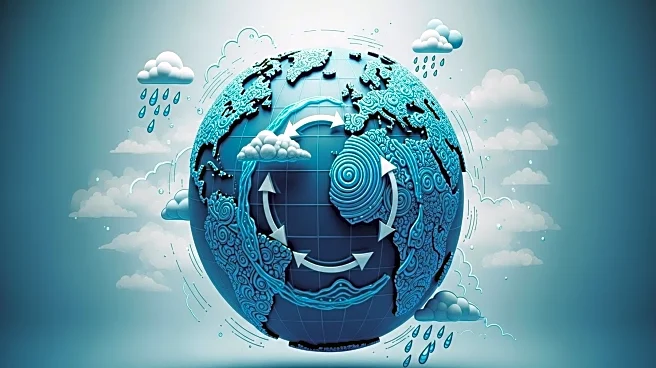What's Happening?
The World Meteorological Organization (WMO) has released a report highlighting the increasingly erratic and extreme nature of the global water cycle. The report notes significant fluctuations between droughts and floods, which are affecting economies and societies worldwide. In 2024, the hottest year on record, many regions experienced severe water shortages, including unprecedented low levels in the Amazon River and extreme droughts in southern Africa. The United States also faced crop failures in states like Texas, Oklahoma, and Kansas. Despite these droughts, the report observed an increase in flooding events, with Europe experiencing its most extensive flooding since 2013 and Hurricane Helene causing catastrophic floods in the U.S., resulting in 230 deaths. The report also highlights the impact of climate change on glacial melting, with significant ice loss in Scandinavia, Svalbard, and north Asia.
Why It's Important?
The erratic water cycle poses significant challenges for global economies and societies. The fluctuations in water availability can lead to economic losses, as seen in the billions of dollars in damages from flood events last year. Additionally, changing water resources can fuel tensions and conflicts, impacting societal stability. The report underscores the importance of water in sustaining societies, powering economies, and anchoring ecosystems. As water-related hazards become more extreme, they increasingly affect lives and livelihoods, necessitating urgent attention to water management and climate change mitigation strategies.
What's Next?
The report suggests that addressing the challenges posed by the erratic water cycle will require coordinated global efforts to manage water resources and mitigate climate change impacts. Stakeholders, including governments, businesses, and civil society, may need to invest in infrastructure and policies that enhance water resilience and reduce vulnerability to extreme weather events. The WMO emphasizes the need for comprehensive strategies to ensure sustainable water management and protect communities from future water-related hazards.
Beyond the Headlines
The report highlights the ethical and cultural dimensions of water management, as access to water is a fundamental human right. The increasing pressure on water resources raises questions about equity and justice, particularly for vulnerable populations who may be disproportionately affected by water scarcity and flooding. Long-term shifts in water availability could also lead to changes in agricultural practices, energy production, and urban planning, necessitating adaptive strategies to ensure sustainable development.











